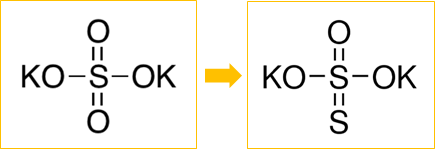Do you know that what is the difference of potassium sulfate and potassium thiosulfate?
Chemical difference might be small but effect in filed is big.
Potassium and sulfur are two main chemical elements in the science of plant nutrition that human being on earth depends on that. Both of these elements have several vital effects on plants and you can imagine that how important is the fertilizer potassium sulfate.
Potassium sulfate is one of the most commonly used fertilizers all around the world. Here we do not want to discuss about importance and roles of potassium sulfate in agriculture. The chemical formula of normal potassium sulfates is K2SO4, but there is a new version of the product which is called potassium thiosulfate with chemical formula of K2S2O3. It has three oxygen molecules instead of four and it also has two sulfur molecules instead of one. This gives great advantages to potassium thiosulfate.

Potassium Sulfate Potassium Thiosulfate
Potassium thiosulfate or what we call kalium thiosulfate in Germany (KTS), is a chlorine-free products with following specifications:
- Liquid form with high solubility
- Free of chlorine
- High absorption efficiency
- Fast reaction in soil and plants
- Affecting plant growth, yield and quality
- Increasing plant resistance against biotic and abiotic
- Improving the aroma and taste of fruits
- Increasing the oil content of the oil crops
- Suitable for foliar application, drip or sprinkler irrigation and flood irrigation
So, it can be concluded that using potassium thiosulfate instead of normal potassium sulfates will reduce the dose of application and increase the efficiency in field.


